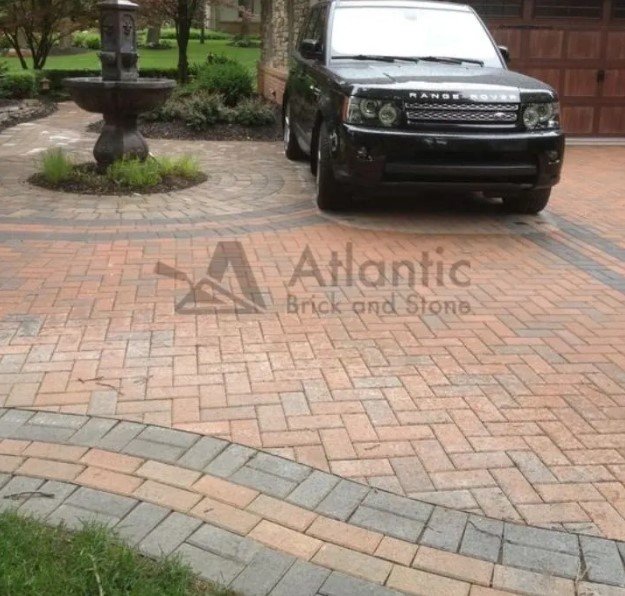Whether you’re running a retail shop or a busy warehouse, your company’s driveway sees a lot of traffic every day. That’s why the surface needs to be both durable and attractive. In the past, many assumed only asphalt or concrete could work. However, pavers are now being used successfully in many commercial settings. In this article we will discuss how choosing the right pavers, installation, and maintenance can provide your business with a surface that stands up to constant traffic while enhancing curb appeal.

When people say “pavers,” they are typically referring to concrete pavers used for driveways and walkways. These come in various materials and shapes, but are most commonly rectangular or square slabs that are dry-laid atop a base. Common paver materials include concrete, natural stone, porcelain, and heavier clay products.
All types of pavers are designed to be driven on when properly installed atop a bed of compacted gravel and/or sand. Their design distributes weight across a broad surface area when laid together, making them capable of handling significant vehicular loads when built to commercial thickness standards (Normally 3 inches). Proper paver installation is important to withstand traffic loads no matter the material.
There are several advantages that make pavers appealing choices for commercial areas’ driveways compared to other options:
There are a few factors to consider when determining if pavers can withstand the demands of high-traffic commercial use:
When installed correctly using the right paver thickness and materials for the job, many commercial properties have found pavers to be a durable alternative to asphalt or poured concrete for driveways, parking lots, and walkways. Their flexibility and appearance adds real estate value compared to monotonous blacktop.
There are a few potential challenges to consider with pavers for commercial use:
With the right planning and specifications from an experienced paver installer, many commercial challenges can be overcome. And long-term cost savings through reduced maintenance typically outweigh higher initial outlay.
To ensure pavers withstand commercial use, focus on these installation and care best practices:
With the right paver type and installation, commercial properties have found these surfaces to offer lower long-term maintenance costs than traditional alternatives. Proper care ensures they’ll stand the test of time.
For commercial property owners in Fredericton looking to install new pavers, working with a local expert is highly recommended. One top-rated hardscaping company to consider is Atlantic Brick and Stone. As Fredericton’s best hardscape contractor, we have decades of experience installing pavers and other masonry for both residential and commercial masonry.
Atlantic Brick and Stone is fully licensed and insured, and we employ only highly skilled craftsmen. We are able to complete both small residential projects and large commercial installations. Our work comes with a multi-year warranty, and reviews consistently praise our quality workmanship, timely completions, and customer service. For durable yet attractive paver driveways capable of handling high traffic needs, Atlantic Brick and Stone should be the first call for commercial property owners in Fredericton.
When planned and cared for accordingly, pavers provide commercial properties with an attractive, durable, and versatile paved surface option. Their advantages of customization, ease of repairs, and permeable stormwater management make them a great choice.
When properly installed, concrete pavers can support over 8,000 pounds per square inch of surface area.
With routine maintenance, interlocking concrete pavers are designed to last 20-30 years or longer in Fredericton before requiring repairs or replacement.
For commercial applications expecting frequent or heavy vehicle traffic, choose pavers at least 60mm or 80mm thick for driveways and walkways respectively. Standard residential pavers are often only 40-50mm thick.
GET STARTED
Create stunning structures with our residential and commercial masonry services in Fredericton. From meticulous designs to the completed build, our process is professional and rewarding, and we can’t wait to build your dream with you.
Atlantic Brick and Stone, one of the best masonry contractors in Fredericton, NB
Contact
8 Muskie Street, Lower Kingsclear, New Brunswick E3E 0E7, Canada